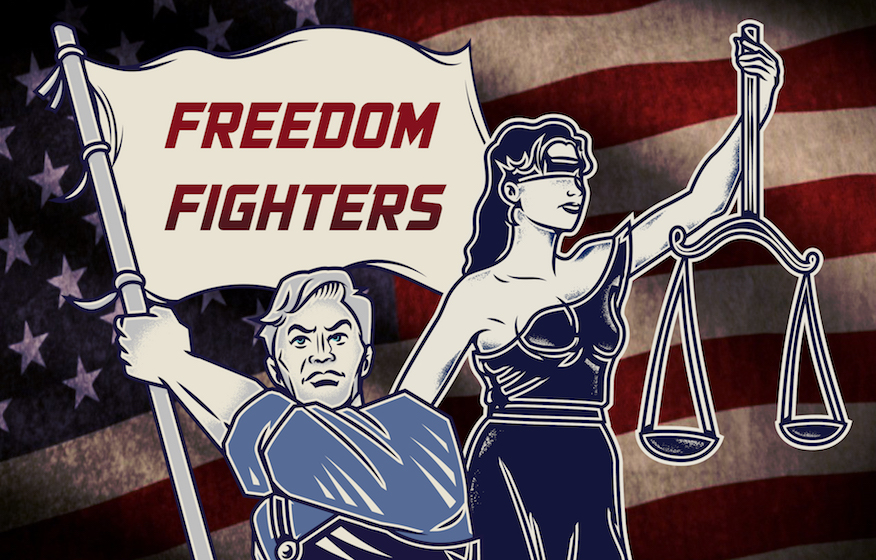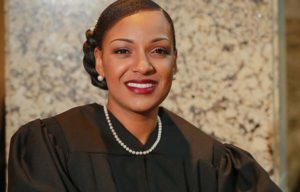Legal Freedom Fighter Series: Judge Ashleigh Parker Dunston

We’ve seen it repeatedly throughout our history: When people’s rights are threatened, it’s the lawyers who step up to the plate. Some are true Freedom Fighters, and they deserve special recognition. That’s why we regularly feature lawyers who are really making a difference.
Today, as part of our series on sexism in the courtroom, we are proud to feature Judge Ashleigh Parker Dunston.

Judge Ashleigh Parker Dunston is a district court judge for the 10th Judicial District, serving Wake County of North Carolina. She has dedicated her life to public service through both her employment and community commitments.
Less than a year after being appointed District Court Judge in the Tenth Judicial District, Judge Dunston penned the insightful and thought-provoking blog post, Sexism: The Elephant in the Courtroom. Since then, she’s had the opportunity to speak on panels and podcasts discussing sexism in the courtroom. She has committed herself to sharing her experiences and the experiences of others in the hopes that this will drive greater conversation and, more importantly, change regarding the issue.
Judge Dunston is both a former prosecutor and Assistant Attorney General and has practiced in courtrooms all across the State of North Carolina, which brings a unique perspective to the bench. She was sworn in and became the third and youngest African American female District Court Judge in Wake County history since the courts were established more than 50 years ago.
Here’s the interview:
What inspired you to initially become a lawyer…and then what compelled you to seek appointment as a district court judge?
“I initially wanted to become a doctor, but I soon realized after my first biology course at Wake Forest University that that career path might not be best suited to me. So, when I decided to become a lawyer, my inspiration was my father, a retired career prosecutor and the first African American to practice law on the western-side of North Carolina. I wanted to become a career prosecutor like my dad and, ironically, we had the same first job out of law school—the Wake County District Attorney’s Office. I sought to be a judge after realizing that there was only one African-American female district court judge out of 19 and that I had unique experiences in practice and in life that would allow me to further serve the community and (hopefully) make a difference in people’s lives.”
Shortly after being sworn in as District Court Judge, you wrote the blog post, Sexism: The Elephant in the Courtroom. What moved you to take a stand and publicly address this issue?
“I experienced sexism almost immediately when I entered the courtroom as a young prosecutor and have continued to experience it throughout my career. My friends and I would always share our experiences but once I became a judge, I felt like I finally had the platform to be able to share them publicly without fear of retaliation.
Once, when I was a lawyer, I was asked by a judge if I was my colleague’s secretary. I quickly informed him that I was not and that I was the attorney assigned to handle the case. Another time, as an Assistant Attorney General, I was standing for calendar call in Superior Court waiting to express the length of time that I expected the case to take. Opposing counsel stood up, said who he was, and then said that the Attorney General’s Office didn’t send anyone, while I was standing right there. I then loudly, assertively, and with conviction stated my name, title, and position, won the case, and drove back to Raleigh. Other women have been completely ignored when trying cases with a male colleague by the judge.
Men have attempted to intimidate women by standing during their arguments or yelling at us in open court. While bending over, I had a male colleague take a picture of my butt in court. Black women specifically have been asked for their bar card (including myself) when entering the courthouse or approaching the bar area. They’ve also been asked where their attorney is—making the assumption that they’re the defendant. The list of such examples is endless.
I personally believe that it’s imperative for judges to call out this demeaning behavior and be vocal that it will not be tolerated in their courtrooms from them or from anyone else. And now that I am a judge, I believe I have the responsibility to speak up for these women who feel like their voices have been silenced. My philosophy is that I should try to make the biggest difference I can in whatever time I’m given.”
What kind of response did you receive?
“Several male colleagues sent me messages and complimented the article. My hope is that they become allies in the fight to end sexism by speaking up when they hear or see something inappropriate. I believe that change will be forthcoming if we continue to keep the discussion alive. I remain hopeful that things can and will change.”
What has been your biggest challenge as a woman in this career?
“My biggest challenge in this career has been defying the odds. I’ve had people tell me I’m too young, too unqualified, and too inexperienced to be in this position. I always get, “You’re a judge? How old are you?” or the worst compliment, “You’re too pretty to be a judge.” I do feel as though I have to overcompensate at times to demonstrate to attorneys or litigants that I am qualified to be in this role and should be taken seriously. I actually experienced the same things as a prosecutor and Assistant Attorney General, but now it’s magnified. However, I refuse to give up. I believe that if you are called to do something or to make a difference, then you push forward and accomplish your dream despite the naysayers.”
What can people do to help improve how female lawyers are treated in the courtroom?
“People need to say something if they see something. In other words, if you see a woman experiencing sexism or sexual harassment in court then you should address the conduct. Furthermore, inappropriate comments often happen when the female lawyer isn’t even present, but those comments should be addressed then, too. We also need to inform our young female attorneys about these situations and let them know that it is not permissible and should not be tolerated.”
If attorneys want to get involved in social justice, how can they get started?
“We all have individual gifts and talents. The first step is to identify what yours are and then find a cause or organization that could use your help. Be passionate about your cause and people will respond. If you can’t give out free legal advice, you can always speak to a group of students, serve in a soup kitchen, or organize a legal event for the community. I’m a firm believer that if you want to see the change, you need to be the change.”
Kristin Johnson is an executive and corporate communications professional, and founder of KSJ Communications, a communications and public relations firm. She consults with a diverse roster of clients spanning the technology, professional services, financial services, public sector, consumer, and healthcare industries. In addition to Rocket Matter, Johnson writes for various other publications as well.
Share post:








